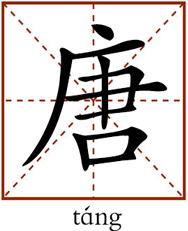Tang Dynasty

This character refers to the Tang Dynasty, which is regularly cited as a great imperial dynasty in ancient Chinese history. It was a golden age of reform and cultural advancement, which laid the groundwork for policies that are still observed in China today. It is used among overseas people to describe something related to China, such as tang ren jie (Chinatown) or tang zhuang (Chinese costumes).
忆昔
yì xī
“Yi Xi,” or “Recalling the Past,” is the title of two poems written by the Tang poet Du Fu (712–770), who is frequently called the greatest of the Chinese poets along with Li Bai (701–762).
The second of the poems was a recollection of the prosperity during the Kaiyuan Era (713–741) of Emperor Xuanzong of Tang (685–762), whose domestic and foreign policies established the Tang Dynasty as the golden age in Chinese history. Emperor Xuanzong’s Kaiyuan Era is usually viewed as a period of political stability, peace in society and economic prosperity, in addition as an era of advances in education, arts and religion. In this poem, Du gives a vivid account of the Tang Empire at its apex. “I recalled the past, Kaiyuan’s days of splendor,/ when even little towns boasted ten thousand households,/ rice grains like liquid lard, glutinous rice white,/ public and private granaries alike full to overflowing./ Roads of all nine ancient provinces free of bandits;/ starting on distant journeys, no one bothered about a lucky day./ Qi silks, Lu white silk, carload on carload;/ men plowed, women tended silkworms, each in proper season;/ in the palace the sage ruler, soothed by sacred music,/ through the empire, comrades forever faithful and true.”
This poem was created when the Tang Empire was struggling after the Anshi Rebellion in 755. With the “Yi Xi,” Du intended to persuade Emperor Daizong (762–779) of Tang to learn from Emperor Xuanzong to become a diligent and wise ruler and to rebuild the Tang as a prosperous country. Du’s greatest ambition was to serve his country as a successful civil servant. His verses sounded a note of profound compassion for humanity and his motherland caught in the grip of senseless war.
